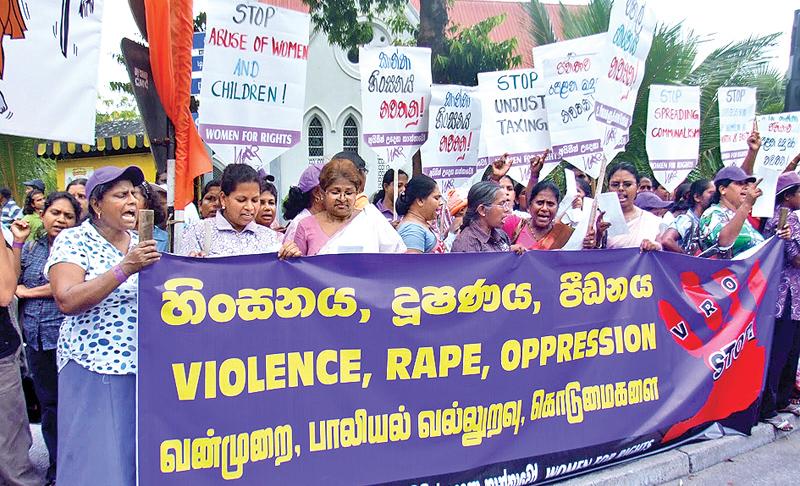
It’s Wednesday night, as I type this, with today’s English dailies spread on the floor, almost every page dominating articles on International Women’s Day (IWD).
Being harassed on the bus, being catcalled and stared at on the road, being told how to live a couple of times, being told about the appropriateness of women’s clothes - a few times, even by men - I had a pretty normal day. Just like any other day. The United Nations Family Planning Association (UNFPA) recently stated that 90% of women in Sri Lanka, aged between 15-35, have been sexually harassed on the roads.
Housemaids
In Sri Lanka, women are twice as likely to be unemployed, compared to men, even though the country’s coffers are filled by the earnings of women who migrate as housemaids, toil at garment factories or at tea plantations. Can you break the glass ceiling? Try harder if you can’t, because it’s as solid as rock.
But, in the media, the President, the Prime Minister as well as the Opposition Leader made statements about IWD, to the effect that humankind depends on empowered women, that women are already more empowered than their male counterparts, and that women’s contribution to the nation is invaluable. Interestingly, these statements were broadcast just after Sri Lanka dodged answering issues raised by the Committee on the Elimination of Discrimination against Women (CEDAW) on women’s issues such as, discriminatory marriage laws, land and livelihood concerns, and strengthening laws that protect women. Does it sound like the decades old problem of governments’ lack of commitment to women’s rights?
Article 16
Domestically, the repeal of Article 16 of the Constitution which many women’s rights organisations requested during the Public Representation Process seem to be ignored. Article 16 makes all written and unwritten laws in existence before the promulgation of the Constitution valid and operative, despite inconsistencies with fundamental rights.
Thus, making personal laws as well as other pre-constitutional laws that violate women’s rights, valid even today, restricting, reducing and reversing women’s rights.
We have a Prevention of Domestic Violence Act that needs to be amended to include emotional violence, but prior to that, needs to be properly implemented to protect women from being tortured in their own homes. The Sunday Observer, in its July 10, issue last year carried an article that the judges are not issuing restraining orders to protect women who have complained of domestic violence, forcing her to return to the man who assaulted her. There were also reports that a man under the restraining order had broken into the house and killed his wife, which has lead many judges to reconsider issuing restraining orders. Either way, seems like a poor choice for women.
It was interesting to read how some men perceive womanhood, respect it and acknowledge the difficulties and injustice that women face today, but still say that women are naturally restricted by menstruating, child bearing, and breastfeeding. But, women in all socio-economic levels accomplish their tasks despite pregnancies, and in some instances, carrying their newborns to the workplace. When will our society accept these conditions and make it a soothing environment for women?
Women are being told what to wear, blamed for any harm that comes to her, and given no opinion on their bodily integrity. Women are continuously judged for their appearance, dress, marital status, the number of children they have.
But on this International Women’s Day, many private companies offer bonanzas, free booze, etc. and the irony is, sadly, lost on many in our society where we define womanhood in categories, and focus on the ‘modern woman’ and how she celebrates Women’s Day.
The articles, one after the other, speak of Girl Power, Women Empowerment, Women’s Rights, Gender Equality, though we don’t seem to grasp one basic factor.
Women are not safe, at home or on the streets. Women are constantly portrayed in a negative light in teledramas, and young girls struggle with the gender stereotypes with which they are measured. Looking at the broader picture, it looks like a long long journey, with many obstacles on the way, that Sri Lanka has to overcome to establish women’s rights.
Tomorrow, all of this will be forgotten, and whether you live in Colombo or not, we’ll start talking about the Big Match and whether it should be banned or not. Big Match, the ones played by men. When women played cricket… it’s just…
Above all, it’s the apathy that many feel for the lack of women’s rights and the impunity for violation of those rights that speak mostly of our society. Often I’ve heard people say, ‘we don’t stone women to death, we don’t restrict them from driving, we don’t kill female fetuses, we don’t…’ but that doesn’t mean we have achieved anything either, unless we actually take proactive measures to protect women in Sri Lanka.
- I.Y.K.
